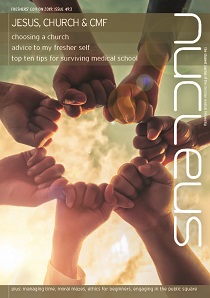can I pray with a patient?
A patient might ask for prayer perhaps with a GP they know to be a Christian, or perhaps from a student who they've got to know well. These situations are the exception, not the rule. But prayer can be greatly valued by patients when the time is right.
The GMC's Personal Beliefs and Medical Practice gives reasonable freedom to discuss spiritual things in these circumstances and affirms the relevance of spirituality to patient care; there is no specific prohibition on praying.
But there is tension between our role as believers, naturally wanting to tell others about Jesus or pray with them, and our role as medical students who primarily meet patients to learn and care for them. A middle way is to offer a brief prayer ourselves, and then refer them to a chaplain (so it's worth getting to know which chaplains are helpful).
can we talk about the gospel with a patient?
Conversations about the gospel fall into a similar vein. CMF's Saline Solution course looks in more detail at how clinicians of any discipline can sensitively discuss Christianity with patients, and when it might be appropriate. A profound discussion of faith may be rather out of place when dealing with an infected insect bite! But when dealing with severe distress, or end of life care, the answer to a simple question like 'do you have a faith that helps you at times like this?' may open a discussion (or make it clear that the conversation should move on).
what does healing mean today?
The gospels contain several accounts of Jesus healing physical illnesses, and healing is mentioned by Paul when discussing spiritual gifts in 1 Corinthians 12. The theological question of whether such gifts operate today is controversial. Former CMF General Secretary Dr Andrew Fergusson's Hard Questions about Health and Healing is a good starting point for those who are new to this topic.
Christians would agree that we are ultimately healed as we are reconciled to God through Jesus' death on the cross. Many would point to occasions where they feel physical or mental illness has been healed through prayer. There is also some evidence of a link between Christian faith and health.
But it will become very clear early on as a medical student that not everyone is physically healed; that Christians do suffer illnesses and eventually die just as everyone else does, and that sometimes prayers for healing may feel unanswered. Thinking through suffering is particularly important for the medic — start here with this video: bit.ly/2akpPc3
what do I do when someone asks me a medical question at church?
From your first day as a medical student, some people will assume that you are the fount of all knowledge about all medical matters. Don't worry. You never will be. Indeed, the day that you think you are is the day you become a clinical risk. I qualified 17 years ago and can always find more to learn!
Most Christians will be aware that a) you are still learning, and b) you are not at work when you are at a church service. But some people will come to you asking for advice. How you respond depends on your stage of training, who is asking, and your own choices about what boundaries you want to have in your relationships at church. Several short scenarios illustrate this:
A linguistics student is getting married next month, and she asks you a general question about how effective the contraceptive pill is. You've just finished a placement in a family planning clinic at the end of your fourth year.
Although not qualified, you probably know the answer, and you don't need to ask any personal questions to clarify. Give the answer, perhaps with the caveat that she might want to talk about contraception with her GP.
A mother who thinks she is noticing autistic traits in her son comes to you asking what you think of him. You've only seen him a couple of times as you usually attend different services. Your paediatric placement didn't include any real community work.
This is tricky ground. You are well out of your depth and shouldn't get medically involved. But this is clearly a member of your church family who is very worried. Though you should be careful not to give specific advice, you may be a great encouragement if you spend some time talking through her worries, and direct her towards a health visitor or GP.
An elderly gentleman, too embarrassed to visit his GP, confides that he has had PR bleeding for the last two weeks.
You don't need much experience to know that this is a serious symptom warranting further investigation. It isn't unreasonable to make this clear to him, and encourage him to see his GP, perhaps seeing if there is someone he knows well in the congregation who could take him to an appointment (or even doing this yourself).
Every couple of weeks, a middle-aged lady seeks you out after the service. She spends at least 15 minutes pouring out her health worries, and her difficulties with local doctors. You begin to try to hurry away before coffee…
The 'heartsink' patient isn't confined to general practice. This illustrates the importance of setting some boundaries about how far your professional role reaches, at church and elsewhere. These will not be the same for every student, though in this case I would suggest ensuring that you don't undermine other doctors in conversation is essential. Explain to her that, while you want to be supportive, you prefer to avoid discussing medical matters in church. As a student, it is easy enough to plead ignorance! Such boundaries become more difficult when qualified, particularly if you are a GP living close to your practice, as some members of your church will probably also be your patients.
Laurence Crutchlow is CMF Associate Head of Student Ministries and a GP in London
































